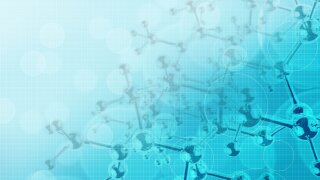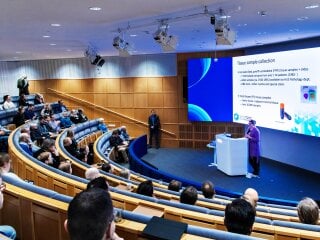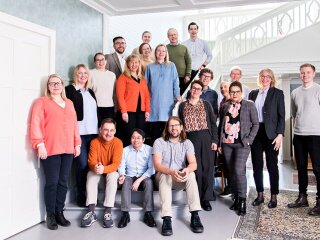In March, Business Finland granted nearly EUR 10 million in funding to build the pharmaceutical R&D ecosystem, and it has earmarked nearly EUR 20 million for the research institutes and companies that will participate in the system. The four-year project led by Orion aims to reduce the time needed to research and develop new innovative medicines by using artificial intelligence and enhancing data processing and analysis.
"Since April, we have been compiling a roadmap for the project and engaging in discussions with partners. Now, we brought the members of the network together to meet each other and hear more about the potential of the project,” says Sammeli Liikkanen, Director, Digital Medicine.
We can no longer ignore the role of artificial intelligence and machine learning
The Orion Ecosystem Day, organised by Orion, was attended by 140 people from pharmaceutical, biotechnology and technology companies, research institutes and universities interested in the project. Speakers at the event included:
- Outi Vaarala, Senior Vice President (R&D & iMeds), Orion
- Samuel Kaski, Professor, Finnish Centre for Artificial Intelligence (FCAI)
- Colin Hill, CEO, Aitia
- Helena Myllyharju, Advisor, Business Finland
- Tarja Enala, Chief Specialist, Ministry of Economic Affairs and Employment
The keynote speakers emphasised the almost limitless opportunities of AI, the importance of cooperation and the significance of the ecosystem project for Finland and Finnish pharmaceutical R&D.
In Finland, we must be able to make better use of data, machine learning and artificial intelligence in order to retain our competitiveness also in the future.”
“Large international pharmaceutical companies have already started adopting methods driven by digitalisation and data. In Finland, we must be able to make better use of data, machine learning and artificial intelligence in order to remain competitive also in the future. The ecosystem project is very important for both Orion and Finland,” Outi Vaarala said.
Virtual tools improve chances of success
Developing a new medicine is expensive and risky. It is estimated that the development of a single drug can cost up to EUR 6 billion and involve tens of thousands of different tests and trials. This is why the potential of AI is such an important asset in data analysis, for example.
“By analysing data with artificial intelligence, we can discover and develop virtual simulation models of patients, known as digital twins. These models often involve entirely new causal findings that explain biology that we don’t yet know about – much of human biology is still completely new to us and unexplored,” said Colin Hill, CEO of Aitia, in his presentation.
The information provided by AI allows drug development to proceed more confidently in the desired direction, without necessarily having to analyse everything in the lab.
If we succeed in this project, we could shorten the drug development process by years, save a huge amount of resources and reduce the impact on the environment.”
“If we succeed in this project, we could shorten the drug development process by years, save a huge amount of resources and reduce the impact on the environment,” says Outi Vaarala.
Finland is taking up the challenge, together
Globally, Orion is a small pharmaceutical company and alone it cannot build a research and development model based on digitalisation and data. It needs a broad range of partners for this work.
“We have the know-how in Finland and the project will enable us to bring that together,” says Helena Myllyharju, Advisor at Business Finland.
Myllyharju says that studies show that RDI (research, development and innovation) investments have virtually dried up in Finland, but the same downward trend cannot be seen globally. Finland does not want to be left behind and aims to increase RDI investment to 4 per cent of GDP by 2030.
“To achieve this goal, we need bold and innovative contributions from major Finnish companies. The virtual drug discovery ecosystem project will ensure that Finland is well placed to succeed in the international billion-dollar pharmaceutical business,” says Helena Myllyharju.
Pharmaceuticals is one of the fastest growing industrial sectors
The ecosystem brought together by Orion is by no means the only large-scale collaborative health sector project in Finland. The pharmaceutical industry has been identified as one of the fastest growing industrial sectors worldwide so national cooperation in the health sector has been significantly intensified. To boost the development of research and innovation activities, the Finnish Government decided to move the National Drug Discovery Center under the mandate of the Ministry of Economic Affairs and Employment.
Ecosystems will create good opportunities in Finland for drug development aiming for commercial success.”
“The aim of the National Drug Discovery Center is to provide a better starting point for Finnish innovation and development activities and to facilitate the utilisation and commercialisation of research results. Ecosystems will create good opportunities in Finland for drug development aiming for commercial success,” says Tarja Enala, Chief Specialist at the Ministry of Economic Affairs and Employment.











